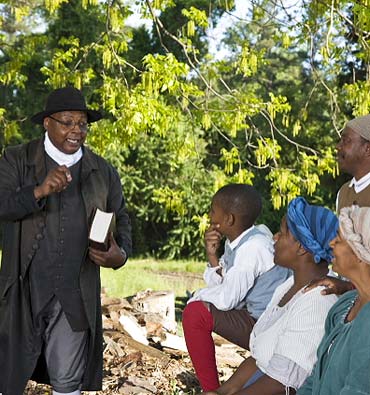
[brightcove videoID=4172282564001 playerID=2893748186001 height=315 width=560]
How should government protect liberty of conscience?
Should the state promote fundamental values, even if those values might seem to promote religion?
In this imagined conversation at Christiana Campbell’s Tavern, Baptist preacher Gowan Pamphlet and five-term Virginia governor Patrick Henry wrestle with these questions.
It’s well known that the first amendment to the U.S. Constitution’s prevents Congress from making any law creating an official religion or preventing citizens from worshiping as the choose. But the First Amendment did not apply the same way to the states until after the Civil War.
Thanks to Thomas Jefferson’s Statute for Religious Freedom, church and state were firmly separated in Virginia from the law’s enactment in 1786. Still, its text seemed to acknowledge a divine influence, as it began with the words, “Whereas, Almighty God hath created the mind free.”
Other states continued to support their majority Christian denominations. New England, in particular, was slow to change. Massachusetts did not make a full break with state support of religion until 1833.
Gowan Pamphlet’s uncertainty about the security of his position heading a growing Baptist congregation, and even his own freedom of conscience, is understandable. In the young nation there were no guarantees that the gains that had been won would be lasting.
Patrick Henry, whose own experience had made him open to diverse Christian practices, was also concerned that government support religion generally as a way to ensure a moral citizenry.
Today we continue to debate how we can create an ethical society without privileging a particular set of religious beliefs or curtailing the freedom of conscience we hold so dear.

I am surprised you did not include the text of the 1st amendment in your narrative. I am quoting it here:
Congress shall make no law respecting an establishment of religion, or prohibiting the free exercise thereof; or abridging the freedom of speech, or of the press; or the right of the people peaceably to assemble, and to petition the Government for a redress of grievances.
Thank you for weighing in. We wanted to emphasize the fact that the 1st Amendment did not stop individual states from making laws restricting religion within their borders.
Although the trend was clearly away from state sponsorship, it wasn’t until the Reconstruction amendments after the Civil War that the Supreme Court began to rule that the Bill of Rights applied to state laws.
And it was well into the 20th century before the First Amendment’s religious freedoms were clearly applied to the states.
The larger point is that citizens have to be vigilant, because there are no guarantees that the world will just keep getting better.
> The larger point is that citizens have to be vigilant, because
> there are no guarantees that the world will just keep getting better.
Yes. Ronald Reagan once said: “Freedom is never more than one generation away from extinction. We didn’t pass it on to our children in the bloodstream. It must be fought for, protected, and handed on for them to do the same, or one day we will spend our sunset years telling our children and our children’s children what it was once like in the United States where men were free.”
I marvel at the country’s founders, so willing to stand for right. As they signed their name to the Declaration of Independence: “And for the support of this Declaration, with a firm reliance on the protection of divine Providence, we mutually pledge to each other our Lives, our Fortunes and our sacred Honor.”
I would hope that spirit is still among us.